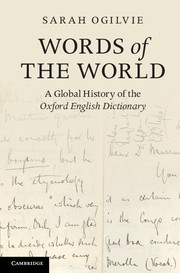Book contents
- Frontmatter
- Contents
- List of illustrations
- List of appendix figures
- Miscellaneous Frontmatter
- Preface
- Acknowledgements
- 1 Entering the OED
- 2 A global dictionary from the beginning
- 3 James Murray and Words of the World
- 4 James Murray and the Stanford Dictionary controversy
- 5 William Craigie, Charles Onions, and the mysterious case of the vanishing tramlines
- 6 Robert Burchfield and words of the world in the OED Supplements
- 7 Conclusion
- Bibliography
- Index
- Plate Section
- References
6 - Robert Burchfield and words of the world in the OED Supplements
Published online by Cambridge University Press: 05 November 2012
- Frontmatter
- Contents
- List of illustrations
- List of appendix figures
- Miscellaneous Frontmatter
- Preface
- Acknowledgements
- 1 Entering the OED
- 2 A global dictionary from the beginning
- 3 James Murray and Words of the World
- 4 James Murray and the Stanford Dictionary controversy
- 5 William Craigie, Charles Onions, and the mysterious case of the vanishing tramlines
- 6 Robert Burchfield and words of the world in the OED Supplements
- 7 Conclusion
- Bibliography
- Index
- Plate Section
- References
Summary
It is exceedingly difficult to draw the line or leave out words. To ignore a country or a subject when compiling a dictionary would be like leaving some gold unmined.
Robert Burchfield (1986), Editor of the dictionary from 1957 to 1986James Murray and the early editors were committed to including words of the world in OED1. They sought readers of international texts, consulted experts in the languages of the world, and applied the historical method so that this subsection of the vocabulary was treated with the same rigour and thoroughness as the rest of the English lexicon. Murray’s personal commitment to foreign words was confirmed by the Stanford Dictionary controversy and challenged by the comprehensive coverage of Fennell’s dictionary. Murray’s successors, William Craigie and Charles Onions, continued the legacy started by Murray but, over time, changed their attitudes towards the anglicization of foreign words by dropping the use of tramlines in the 1933 Supplement. Although they admitted in the preface of the 1933 Supplement that it was difficult to decide on which foreign words to omit or include, this chapter seeks to discover how many they did include and how their work compared with that of their successor, Robert Burchfield. After all, it was Burchfield who was most vocal in the 1970s against the coverage of loanwords and World Englishes by his predecessors. And it is Burchfield who is renowned today for being the first OED editor to open the pages of the dictionary to words supposedly neglected by his predecessors. But was Burchfield as inclusive in practice as he claimed in theory?
First, it is necessary to highlight the differences between a supplement dictionary and its parent dictionary. A parent dictionary has a relatively balanced representation of different types of vocabulary – common, literary, slang, foreign or scientific terms – but a supplement dictionary is limited to vocabulary that was either not included in the main dictionary or needs amendment. It is not possible to compare with any statistical rigour the coverage of types of vocabulary in a supplement dictionary with its parent dictionary because the remit of each text is too dissimilar.
- Type
- Chapter
- Information
- Words of the WorldA Global History of the Oxford English Dictionary, pp. 165 - 209Publisher: Cambridge University PressPrint publication year: 2012



